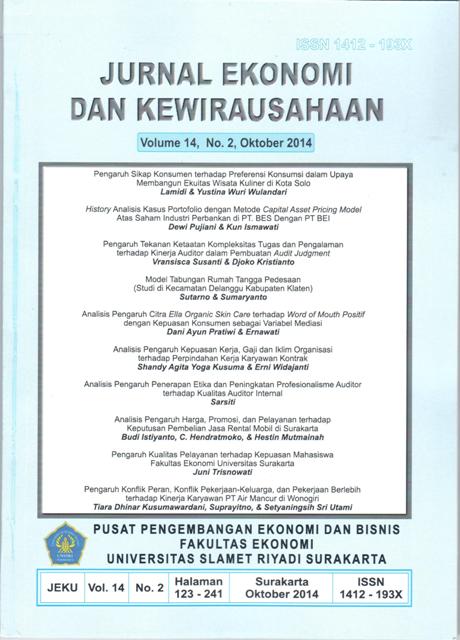PENGARUH TEKANAN KETAATAN KOMPLEKSITAS TUGAS DAN PENGALAMAN TERHADAP KINERJA AUDITOR DALAM PEMBUATAN AUDIT JUDGMENT
Abstract
Auditors are often faced with a decision that the result is not enough by a code of ethics and by generally acceptable accounting standards. A key consideration in the decision is ethical, although often involving multiple conflicts of interest. Judgment professional accountants can be corrupted by conflicts of interest. There are two conflicting interests, the real conflict and latent conflict. The purpose of this study was to analyze the significance of the effect of obedience pressure, task complexity on audit judgment and experience in public accounting in Surakarta and Yogyakarta partial and simultaneous This study is a survey of auditors in public accounting firm of Surakarta and Yogyakarta. The sampling technique used purposive sampling to sample 34 auditors. Analysis using the classical assumption of multiple linear regression analysis, F test, t test, the coefficient of determination. The results showed that the pressure obedience positive and significant impact on audit judgment of auditors in Surakarta and Yogyakarta with p value (0,000 < 0,05). The complexity of the task positive and significant impact on audit judgment of auditors in Surakarta and Yogyakarta with p value (0,017 < 0,05). Experience positive and significant impact on audit judgment of auditors in Surakarta and Yogyakarta with p value (0,034 < 0,05). Variable pressure obedience, task complexity and experience jointly influence on audit judgment (0,000 < 0,05). Keywords: obedience pressure, task complexity, experience, judgment auditDownloads
Published
2015-01-07
Issue
Section
Artikel
License
Authors who publish this journal agree to the following terms:
- Authors retain copyright and grant the journal right of first publication with the work simultaneously licensed under a Creative Commons Attribution License that allows others to share the work with an acknowledgement of the work's authorship and initial publication in this journal.
- Authors can separately make additional contractual arrangements for non-exclusive distribution published by the journal (e.g., publish it in a book), with an acknowledgement of its initial publication in this journal.
- Authors are allowed and encouraged to send their work via online (e.g., in the institutional repositories or their website) after published by the journal.









